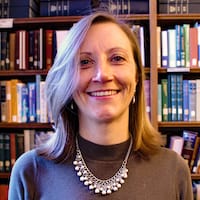
Staff Scientist
Department of Terrestrial Magnetism
Carnegie Institution for Science
| 2014 - Present | Staff Scientist | Carnegie Institution for Science, Washington, DC |
| 2014 (Spring) | Associate Professor | University of North Carolina at Chapel Hill, Chapel Hill, NC |
| 2008 - 2013 | Assistant Professor | University of North Carolina at Chapel Hill, Chapel Hill, NC |
| 2005 - 2007 | Postdoctural Fellow | Carnegie Institution for Science, Washington, DC |
| 2005 | Ph.D., | University of Arizona, Tucson, AZ; Advisor: Susan Beck |
| 2000 - 2005 | Graduate Research Assistant | University of Arizona, Tucson, AZ |
| 2002 | Research Intern | Lawrence Livermore National Laboratory, Livermore, CA |
| 2001 | Research Intern | BP, Houston, TX |
| 1996 | B.A., Cum Laude, History/Sociology | Columbia College of Columbia University New York, NY |
| 2018 | IRIS Workshop Plenary Session Organizer | |
| 2015 - 2017 | IRIS-PASSCAL Standing Committee Chair | |
| 2014 - 2015 | IRIS-PASSCAL Standing Committee Member | |
| 2013 | IRIS Research Experience for Undergraduate Referee | |
| 2009 | Board of Directors Nominating Committee Member | |
| 2008 - 2010 | IRIS-PASSCAL Standing Committee Member |
| 2017 | Earthscope Synthesis Workshop Co-Organizer | |
| 2013 | IRIS/SSA Distinguished Lecturer | |
| 2013 | NSF-Earthscope National Meeting Tri-Chair, Raleigh, NC (May 13th-15th) |
As with many seismologists of my generation, it is difficult for me to imagine seismology research without IRIS. The core programs of the PASSCAL Instrument Center, DMC, GSN, and E&O continue to act as the foundation on which so many of us build our careers and advance our science. IRIS’s long experience with all of these programs has enabled its tremendously successful role in EarthScope, both in the lower 48 and in Alaska. I am excited to hear that NSF has recognized the centrality of IRIS to seismological research and has committed to its funding for the next five years. These next five years will likely be ones of challenges and change as the needs of our science evolve and at times outpace the realities of current funding. I am confident that we can rise to the occasion. IRIS has always been an organization directed and governed by the scientists it serves. If elected, I would see my service as Board member as an opportunity to listen to scientists from the many different communities served by IRIS and to bring their concerns, needs, and scientific aspirations to the decision making table. IRIS’s strength lies in its people, and as long as we all remain engaged, I’m confident we will continue to see a bright future for this consortium.